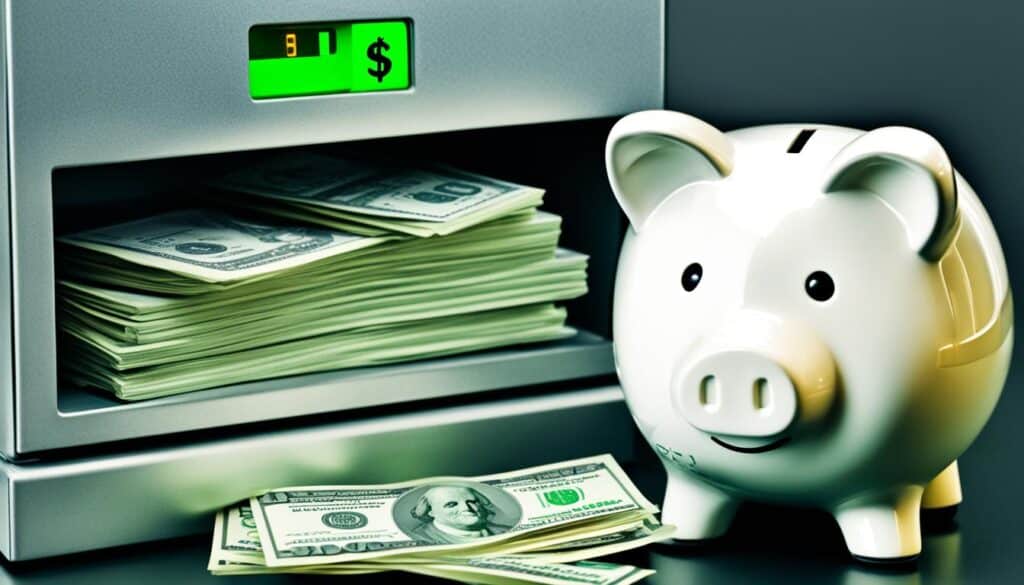Picture this: you’re sitting at your dining room table, sifting through a stack of paperwork and bills. As you shuffle through the pile, your eyes land on a familiar item – the receipt for your safe deposit box rental fee.
It’s no secret that keeping your valuables secure is a top priority, but did you know that there may be a way to save some money come tax season? The question on your mind is, “Are safe deposit box fees tax deductible?”
Key Takeaways:
- Safe deposit box fees are generally not tax-deductible on personal bank accounts.
- There are two exceptions: early withdrawal penalties on CDs and rental fees for storing taxable income-producing stocks, bonds, or investment-related papers.
- It’s important to understand the guidelines set by the IRS to determine if you are eligible for a deduction.
- Consider consulting a tax professional for tailored advice on maximizing your tax benefits.
- Keep proper records to substantiate your deductions and maintain a clear separation between personal and business expenses.
Deductions for Unreimbursed Employee Expenses
Are you aware that certain unreimbursed employee expenses can be deducted from your taxes? If you find yourself in specific employment categories, you may qualify for this beneficial deduction. Let’s take a closer look at who is eligible and how you can maximize this deduction for your tax return.
Who is Eligible?
If you fall into any of the following categories, you may qualify for deductions for unreimbursed employee expenses:
- Armed Forces Reservist: As a member of the Armed Forces Reserves, you can deduct expenses related to travel, uniforms, and equipment necessary for your service.
- Qualified Performing Artist: If you work in a performing arts profession, expenses such as stage makeup, costumes, and musical instruments can be claimed as deductions.
- Fee-Basis State or Local Government Official: Expenses incurred by fee-basis state or local government officials, such as travel and office supplies, can be deducted.
- Employee with Impairment-Related Work Expenses: Individuals with disabilities who incur additional expenses related to their job, such as specialized equipment or transportation costs, may be eligible for deductions.
These deductions are considered adjustments to your gross income and should be reported on Form 2106. Remember to keep detailed records and receipts to substantiate your expenses. It’s essential to provide proper documentation to verify your deductions and avoid any complications with the IRS.
Now, let’s visualize the eligibility criteria in a concise table format:
| Category | Examples of Eligible Expenses |
|---|---|
| Armed Forces Reservist | Travel expenses, uniforms, equipment |
| Qualified Performing Artist | Stage makeup, costumes, musical instruments |
| Fee-Basis State or Local Government Official | Travel expenses, office supplies |
| Employee with Impairment-Related Work Expenses | Specialized equipment, transportation costs |
Remember, it’s crucial to consult a tax professional or financial advisor to ensure you take full advantage of the deductions available to you. They will provide personalized advice based on your unique circumstances. Stay organized, accumulate proper documentation, and navigate the tax landscape confidently.
Educator Expenses Deduction
As an educator, you play a vital role in shaping young minds and fostering a positive learning environment. The good news is that the IRS recognizes the significant expenses you incur to provide the best education to your students. The educator expenses deduction allows you to deduct certain qualified expenses as an adjustment to your gross income, providing you with valuable tax savings.
To qualify for the educator expenses deduction, you must be a teacher, instructor, counselor, principal, or aide working in a school for at least 900 hours during the school year. These dedicated professionals contribute their time and effort to ensure students receive high-quality education and support.
Qualified expenses that can be deducted include classroom supplies, books, computer equipment, and professional development courses. Let’s take a closer look at each category:
1. Classroom Supplies
As every teacher knows, a well-equipped classroom is essential for effective teaching. From pens and paper to art supplies and educational materials, the costs can quickly add up. The good news is that you can deduct these expenses as part of the educator expenses deduction. Keep track of your receipts and make sure to include them when claiming your deduction.
2. Books
Books are the cornerstone of education, and as a teacher, you often invest in books to enhance your curriculum and provide a wide range of educational resources for your students. Whether you purchase novels, textbooks, or reference materials, you can deduct the cost of these books as part of the educator expenses deduction.
3. Computer Equipment
In today’s digital age, technology plays a crucial role in education. Many teachers invest in computers, laptops, tablets, or other electronic devices to enhance their teaching methods and engage their students. If you purchase computer equipment for educational purposes, you can include the cost in your educator expenses deduction.
4. Professional Development Courses
Continuing education is essential for educators to stay current with the latest teaching methods and developments in their field. The cost of professional development courses, workshops, conferences, or seminars can be deducted as part of the educator expenses deduction. Investing in your professional growth not only benefits you but also enhances the learning experience for your students.
It’s important to note that there is a limit to the amount you can deduct. For most educators, the maximum deduction is $250 if you’re single or $500 if you’re married and filing jointly. Additionally, expenses reimbursed by your school or any other organization are not eligible for the deduction.
Claiming the educator expenses deduction is a way to recognize and appreciate the dedication and hard work educators put into shaping the future. Make sure to keep accurate records of your expenses and consult with a tax professional to ensure you take full advantage of this valuable tax benefit.

| Eligible Educator | Maximum Deduction |
|---|---|
| Single Educator | $250 |
| Married Educator (Filing Jointly) | $500 |
Unreimbursed Employee Expenses You Can’t Deduct
While some unreimbursed employee expenses can be deducted, there are certain expenses that are not eligible for deduction. These expenses fall under the category of miscellaneous deductions subject to the 2% AGI (adjusted gross income) limit.
Here are some examples of non-deductible employee expenses:
| Expense | Category |
|---|---|
| Appraisal fees | Non-deductible |
| Casualty and theft losses from property used in performing services as an employee | Non-deductible |
| Clerical help and office rent for investments | Non-deductible |
| Credit or debit card convenience fees | Non-deductible |
| Depreciation on home computers used for investments | Non-deductible |
These are just a few examples of expenses that are not eligible for IRS deduction. It’s crucial to review the IRS guidelines to determine which expenses are qualified for deduction. Keep in mind the 2% AGI limit when claiming miscellaneous deductions.
Reviewing the IRS Guidelines
It’s important to familiarize yourself with the IRS guidelines to ensure you are accurately claiming deductions on your tax return. The IRS website provides comprehensive information and resources regarding deductible and non-deductible expenses. Take the time to read through the guidelines and consult a tax professional if you have any specific questions or concerns.
By understanding which employee expenses are not deductible, you can avoid potential errors on your tax return and ensure compliance with IRS regulations.
Tax-Related Expenses You Can Deduct
When it comes to tax deductions, it’s always a good idea to explore every avenue for saving money. There are several tax-related expenses that you can deduct on your tax return, potentially reducing your overall tax liability. Let’s take a closer look at some of these deductible expenses:
- Long-Distance Phone Calls to the IRS: If you’ve ever had to make a lengthy phone call to the IRS to resolve a tax-related issue, you’ll be glad to know that you can deduct the cost of those calls on your tax return.
- Tax Preparation Fees: Hiring a tax professional or purchasing tax preparation software can be a worthwhile investment. The good news is that you can deduct these expenses on your tax return, helping to offset the cost of getting your taxes done.
- Software Costs for Tracking Deductible Expenses: If you use software to keep track of your deductible expenses throughout the year, you can deduct the cost of that software on your tax return.
- Taxable Sales of Assets and Investments: If you sell assets or investments that generate taxable income, you can deduct any applicable sales taxes paid on those transactions.
If you prepare your own taxes, you can also take advantage of additional deductions:
- Cost of Tax-Planning and Tax-Preparation Manuals: If you purchase tax-planning or tax-preparation manuals, you can deduct the cost of these resources on your tax return.
- Tax-Preparation Software, E-Filing Fees, and Postage: If you use tax-preparation software or choose to file your taxes electronically, you can deduct the cost of the software, e-filing fees, and any postage expenses if you choose to mail a paper return.
Furthermore, legal expenses related to tax advice may also be deductible:
- Attorney’s Fees for Tax Advice or Divorce Proceedings: If you seek tax advice from an attorney or incur legal fees related to securing alimony in a divorce or fighting court cases against the IRS, you may be able to deduct part of the attorney’s fees on your tax return.
Remember, when claiming any deductions on your tax return, it’s essential to keep accurate records and retain supporting documentation. Organized records will help substantiate your deductions and minimize the risk of an audit.

Being aware of the tax-related expenses you can deduct can save you money and optimize your tax return. Consult with a tax professional to ensure you are taking advantage of all eligible deductions and to receive personalized advice tailored to your specific situation and financial goals.
Investment-Related Expenses You Can Deduct
If you have investments that produce taxable income, you can take advantage of certain deductions to reduce your tax liability. Here are the investment-related expenses that you can deduct:
1. Safe-Deposit Box Rental Fees
When it comes to storing taxable securities, your safe-deposit box rental fees are tax-deductible. It’s important to note that this deduction applies only if you store investments that generate taxable income in the safe-deposit box. Personal items, jewelry, and tax-exempt securities are not eligible for this deduction.
2. Investment Books, Magazines, and Newsletters
If you purchase investment-related reading materials such as books, magazines, or newsletters for advice and information, you can deduct the cost of these resources. Whether you’re expanding your knowledge or staying up-to-date with market trends, this deduction can help you offset your investment expenses.
3. Computer Software or Online Services
If you use specialized computer software or online services for taxable investment activities, you can deduct the cost from your taxable income. This includes software or services used for tracking investments, analyzing market data, and managing your investment portfolio.
4. Computers Used Partially for Investment Purposes
If you use a computer for both personal and investment-related purposes, you can claim depreciation on the portion of the computer’s cost that is allocated to investment activities. Keep track of the percentage of time you use the computer for investment purposes to ensure accurate depreciation deductions.
5. Investment Counseling and Management Fees
If you enlist the services of an investment advisor or pay fees for investment management, these expenses are tax-deductible. Whether you receive personalized investment advice or have your portfolio professionally managed, you can deduct the associated fees.

| Deductible Investment Expenses | Non-Deductible Investment Expenses |
|---|---|
|
|
By deducting these investment-related expenses, you can minimize your taxable income and potentially increase your overall investment returns. However, keep in mind that it’s always wise to consult with a tax professional for personalized advice based on your specific financial situation.
Recordkeeping and Separation of Business and Personal Accounts for Deductions
When it comes to deductions, proper recordkeeping and the separation of business and personal accounts are essential. To ensure you meet IRS requirements and maximize your tax benefits, follow these important guidelines:
Maintain Detailed Records
Keeping accurate records is crucial when claiming deductions. Be sure to retain receipts, canceled checks, substitute checks, and financial account statements as documentary evidence to verify your deductions. These records will help support your claims and provide clarity during tax audits.
Separate Business and Personal Bank Accounts
Business owners and self-employed individuals must separate their business and personal bank accounts. This separation allows for clear distinction and accurate reporting of business expenses, ensuring that deductions are legitimate and compliant with IRS regulations.
Use Appropriate Accounts for Transactions
When conducting business transactions, always use the designated business account. Separating business expenses from personal expenses simplifies recordkeeping and helps prevent confusion or errors that may trigger IRS scrutiny. Using the correct account will ensure that your deductions are categorized appropriately and supported by accurate documentation.
Benefits of Recordkeeping and Separation
Maintaining detailed records and separating accounts offer several advantages. Firstly, it demonstrates your commitment to accurate reporting and compliance with IRS requirements, mitigating the risk of potential penalties or audits. Additionally, it allows for swift identification and verification of deductions, enabling you to maximize your tax savings and minimize your tax liability.
By practicing effective recordkeeping and account separation, you can confidently navigate the intricacies of tax deductions, ensuring that your business expenses are recognized as “ordinary and necessary” by the IRS.
To visually summarize the importance of recordkeeping and separation of accounts, refer to the following comparative table:
| Benefits | Recordkeeping | Separation of Accounts |
|---|---|---|
| Accuracy | Ensures proper documentation for deductions | Helps differentiate personal and business expenses |
| Compliance | Meets IRS requirements for documentation | Demonstrates adherence to business practices |
| Efficiency | Facilitates identification of deductible expenses | Simplifies recordkeeping and reporting |
| Tax Savings | Maximizes eligible deductions | Minimizes tax liability |
Implementing proper recordkeeping and separation of accounts is crucial to ensure the accuracy and compliance of your deductions. By following these guidelines, you can confidently navigate the complexities of IRS requirements and maximize your tax benefits.
Consult a Tax Professional for Individualized Advice
Are you feeling overwhelmed by the complexities of tax deductions? Unsure about whether you qualify for certain deductions, such as safe deposit box fees or unreimbursed employee expenses? Don’t worry, you’re not alone. Tax laws can be confusing, and they’re constantly changing.
That’s where a tax professional or financial advisor can be your saving grace. By consulting a tax professional, you’ll gain access to expert tax advice tailored to your unique circumstances. They can help you navigate the intricacies of the IRS regulations and ensure that you make the most of the deductions available to you.
With their guidance, you’ll have peace of mind knowing that you’re maximizing your tax benefits while remaining fully compliant. They can help you ask the right questions, uncover deductible expenses you may have overlooked, and provide personalized solutions based on their in-depth knowledge of the tax code.
So, whether it’s understanding the eligibility criteria for deductions or identifying potential pitfalls, consulting a tax professional is the smart move to make. They will save you time, minimize your stress, and help you keep more money in your pocket. Don’t leave money on the table – reach out to a tax professional today!








